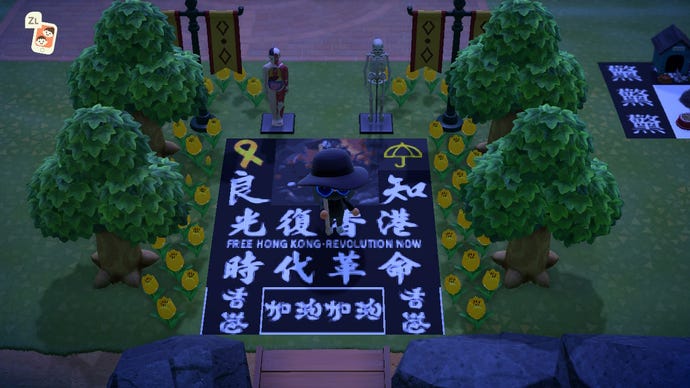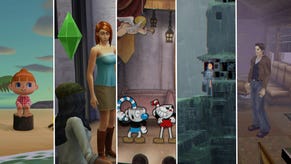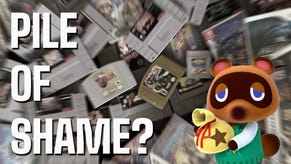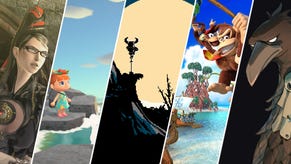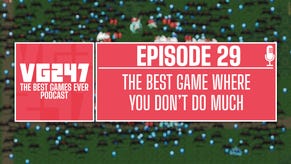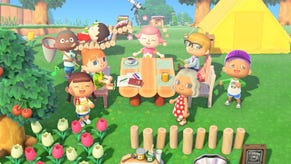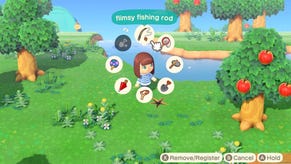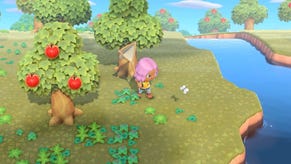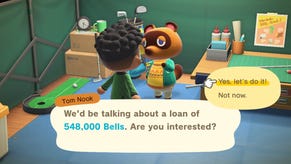Animal Crossing: New Horizons is Fast Becoming a New Way for Hong Kong Protesters to Fight for Democracy
The COVID-19 pandemic has halted public demonstrations, so protesters are taking their cause to Animal Crossing.
This article first appeared on USgamer, a partner publication of VG247. Some content, such as this article, has been migrated to VG247 for posterity after USgamer's closure - but it has not been edited or further vetted by the VG247 team.
It's a quiet Monday night in the age of COVID-19, and I've just been invited to a stranger's Animal Crossing: New Horizons island to take photos of Hong Kong protest art. My host on Pikapika Island, v? (or "vice"), greets me in a black and yellow protest-themed custom outfit. Following the usual polite Animal Crossing etiquette, I drop a stack of my island's native fruit—pears—and he gives me a black privacy mask. "For you," he types in the game's chat feature. He tells me I'm free to run around and take pictures.
The first big artwork I encounter is a huge picture of Hong Kong Chief Executive Carrie Lam with a dog bowl placed next to her mouth. Soon, I find myself walking through a carefully-planted flower garden with a yellow umbrella theme, and other banners that proclaim "five demands, and not one less," referring to the pro-democracy movement's core demands, which include universal suffrage, an official investigation into police brutality, and amnesty for the protesters.
On a high cliff is another Carrie Lam creation—one that's been widely shared on social media—this time festooned with trash bags and a strategically-placed piece of dinosaur fossil poop. Atop another cliff is a full rock-concert setup with drums, a mic, and a grand piano, all against a backdrop of dramatically-lit protest slogans, bauhinia flowers, yellow ribbons, and umbrella icons. There's even a small enclave set up like a casino, not unlike Hong Kong's neighbor, the gambling mecca of Macau. Wherever I go, I can't run five feet without bumping into some form of protest iconography.
This is not your average Animal Crossing island.

I found myself here through Bahamut, a Taiwanese gaming forum where v? posted a screenshot of his handiwork. He's from Hong Kong, but uses the forum anyway, a sign of solidarity across borders as Taiwan and Hong Kong have traditionally supported each other in matters of political and legislative independence from China, especially in the matter of free elections. Now with real-world international travel at a standstill, there's an added sense of poetry in an island-based game becoming a medium for continued political discourse.
The latest incarnation of Hong Kong's pro-democracy movement began with a peaceful sit-in on March 2019, but gradually escalated into a nightmarish cycle of police brutality and violence. Last year's protests were triggered by a controversial extradition bill that was finally scrapped in October 2019, which was one of the five key demands of the movement. Only one demand has been met so far—withdrawal of the extradition bill—and even then, Lam took her time in doing so.
As Hong Kong's government leader, Lam is a controversial figure, with a polarizing record that includes banning a minor independent party and failing to show decisive leadership in the face of a million-strong march. In November 2019, pro-democracy candidates overwhelmingly won Hong Kong's local district council elections, and in February 2020, a survey indicated that Lam had a ratings approval of just 9.1%. Now, with ongoing public health concerns, demonstrations and gatherings have temporarily stopped. In the face of quarantine lockdown procedures, New Horizons' multiplayer and custom design features have created an outburst of in-game protest art that you'd normally find on the city's streets or its expressive Lennon walls.
At the height of Hong Kong's pro-democracy protests in late 2019, mainland Chinese players took to the streets of Grand Theft Auto 5 to combat Hong Kong players dressed in black clothing and yellow helmets. Armed with guns and petrol bombs, the two sides faced off in bloody brawls, with the mainlanders ultimately winning due to sheer numbers. Violence is an intrinsic part of GTA's freewheeling open world, which made sense as a virtual battleground for real-world protesters drawing attention to their cause. Now, a more peaceful extension of the pro-democracy movement has sprung up in a very different type of game: Animal Crossing: New Horizons.
Before New Horizons, Twitter user Heung Yan (@heung_yan), a student in their 20s, had never played Animal Crossing. Since Hong Kong announced a public health lockdown of no more than four people gathering in public—a sucker-punch to the grassroots pro-democracy movement even in pre-coronavirus times—Animal Crossing: New Horizons has become a place for Hong Kongers to keep the protest alive. Heung Yan made a black ?? (Xianggang, Hong Kong in Chinese) shirt to wear two days after getting the game, sharing a screenshot on an Animal Crossing-themed Twitter thread by popular protest art account @uwu_uwu_mo. The more photorealistic posters are made with the help of ACpatterns.com, a website which allows players to import custom designs into the game.
"I saw others' art on Twitter and I [thought it] funny, so I made one too," Heung Yan says in a direct message. "Animal Crossing is very popular among the world now, so I think if we can connect others through Animal Crossing and let them know more about the [protests], it will be great." As for now, they stick to playing with friends. "It's a bit difficult to invite strangers to our island," they explain. "So I think the best way to show our protest art is to make it then post it on social media."
Historically, Animal Crossing games have long been a refuge for players looking to practice kindness and sharing in a calm, low-pressure game environment where you can't get (seriously) hurt or die. At the same time, the series has prompted a vigorous round of discourse on class politics, colonialism, capitalism, and consumerism-real-world issues that add depth to an otherwise innocuous family-friendly game. As a social sim, it's become an unexpected layer of reality holding our pandemic-blighted world together.
Today, there are videos of players smacking images of Carrie Lam, screenshots of uplifting posters with the movement's mascot Linpig, and "photos" of black-clad players posing with the democracy movement's iconic umbrellas. There's art of Lam's portrait on a funeral banner, and posters of gas-masked protesters with the slogans "Restore Hong Kong" and "If you give up, who guards our city?" These have been quietly posted on Twitter, Facebook, regional gaming forums, and Instagram. Twitter user @chaisilmeow shared a screenshot of their villager in a black gas mask next to the words "????" ("Hong Kong independence") and explained that their creative motivation was to remember the 2019 death of Chan Yin Lam, a teenager who helped to distribute protest leaflets. "We support Hong Kong independence! Protect our children!" they wrote in a message.
Joshua Wong, Secretary-General of the democratic youth movement Demosisto, tweeted a supportive post of Animal Crossing: New Horizons protest art on March 27. "I play the game, I just bought it a few days ago," he says in a call on Monday. "For lots of people around the world who play this game, they have to put their ideal life into the game, and for Hong Kongers, we have to put our protest movement and our protest sites inside the game."
This is the first time that Wong, 23, is playing an Animal Crossing game. On a normal day, he's an avid Pokemon and Super Smash Bros. fan. "Frankly speaking, without the coronavirus, I don't believe Hong Kongers would go through such a tremendous effort in decorating their islands to be a protest site," he says. After the outbreak of the coronavirus, he explains, it was difficult to organize physical gatherings. "We set up a livestreamed online assembly, but livestream assembly is still a bit...boring. With a new game out, we can have virtual protests, and we just have to use our creativity to make a new kind of protest tool." Is Wong making protest art of his own? "Yes, of course," he says, though he doesn't feel it's ready to be shown yet. "I'm not professional enough, I'm still collecting trees."
The pro-democracy spirit extends beyond the borders of New Horizons, too—it's also a part of mindful consumer behavior even as New Horizons breaks sales records. One Twitter commenter pointed out that the official Hong Kong distributor for Nintendo Switch products is "blue"—a sign that indicates support for the government and the police, confirmed by Wong; blue is, of course, the color of police uniforms. Yellow represents those who support the movement.
Besides wearing yellow ribbons, protesters also use this color-coded system as a way of identifying shops and restaurants that are friendly to the cause. Businesses that display their political allegiance run the risk of attracting vandals from the opposing color camp; for instance, a yellow-ribbon restaurant was defaced by masked individuals, whom many speculate were supporters of the government. "Most of us will order the Switch/game from other countries, or buy it from the Nintendo eShop," Heung Yan says. "It's part of our yellow economic cycle. Some [gamers] will also buy it from [small shops] which are yellow."
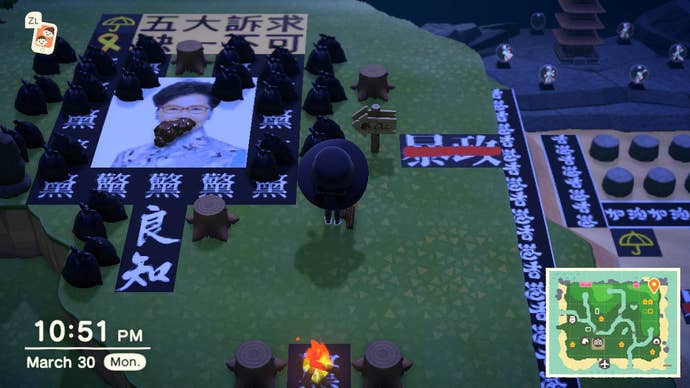
They went on to explain that protesters use yellow economic cycle apps like WhatsGap to monitor a shop's allegiances, which are updated with crowdsourced information. "People asked around not to buy from the official retailer [because] it is a blue shop," concurs a member of Studio Incendo, a Hong Kong and Japan-based collective of photographers and editors behind a "hitting villains" video, which shows players beating images of Carrie Lam with nets. "We bought it from the eShop."
Studio Incendo, for one, had a bit of foreign inspiration to make their "hitting" video. "We saw some Japanese beating Shinzo Abe in the game on Twitter," they reveal on Facebook Messenger. "HKers have been too stressed and unhappy... we thought the video would make people laugh." Like Wong, the group is playing Animal Crossing for the first time, too, but admitted that due to the scope of the release, "[they] would play it anyway."
Naturally, anti-protest tweets have appeared with cries of "no politics in games." Studio Incendo disagrees. "I think [in-game protest art] is a good way. A softer way that can reach unreachable people," they say. And as with every conversation about the polarizing nature of politics in games, Studio Incendo pointed to the BioShock series as proof that games have always included political messages. "In most MMO games (Warcraft/CS), people with different political views are always fighting, like Chinese vs Taiwanese players in the Call of Duty series," they say.
Indeed, it's hard to imagine a world in which people didn't fight about the time and place of political discussion, even in an idyllic setting like Animal Crossing. "If we could have protest art on streets, it would be great, but because we can't get it on the street because of the virus, protest art in the game is really interesting," Wong says of critics who believe that in-game protest art is trivial, and perhaps not as respected as traditional artforms. "Thank you Nintendo, for releasing this game with good timing."
Echoing Wong's sentiment, Heung Yan says, "It's a hard time right now, and it's impossible for us to go out and make something to catch the attention from the world. I think it's a great idea to show the world our protest did not stop...I hope we can have a yellow map of Animal Crossing islands too. That will be great; I will travel to all of them."
Editor's Note: Many individuals sourced in this piece wished to remain anonymous, and are thus referred to by their online handles.
